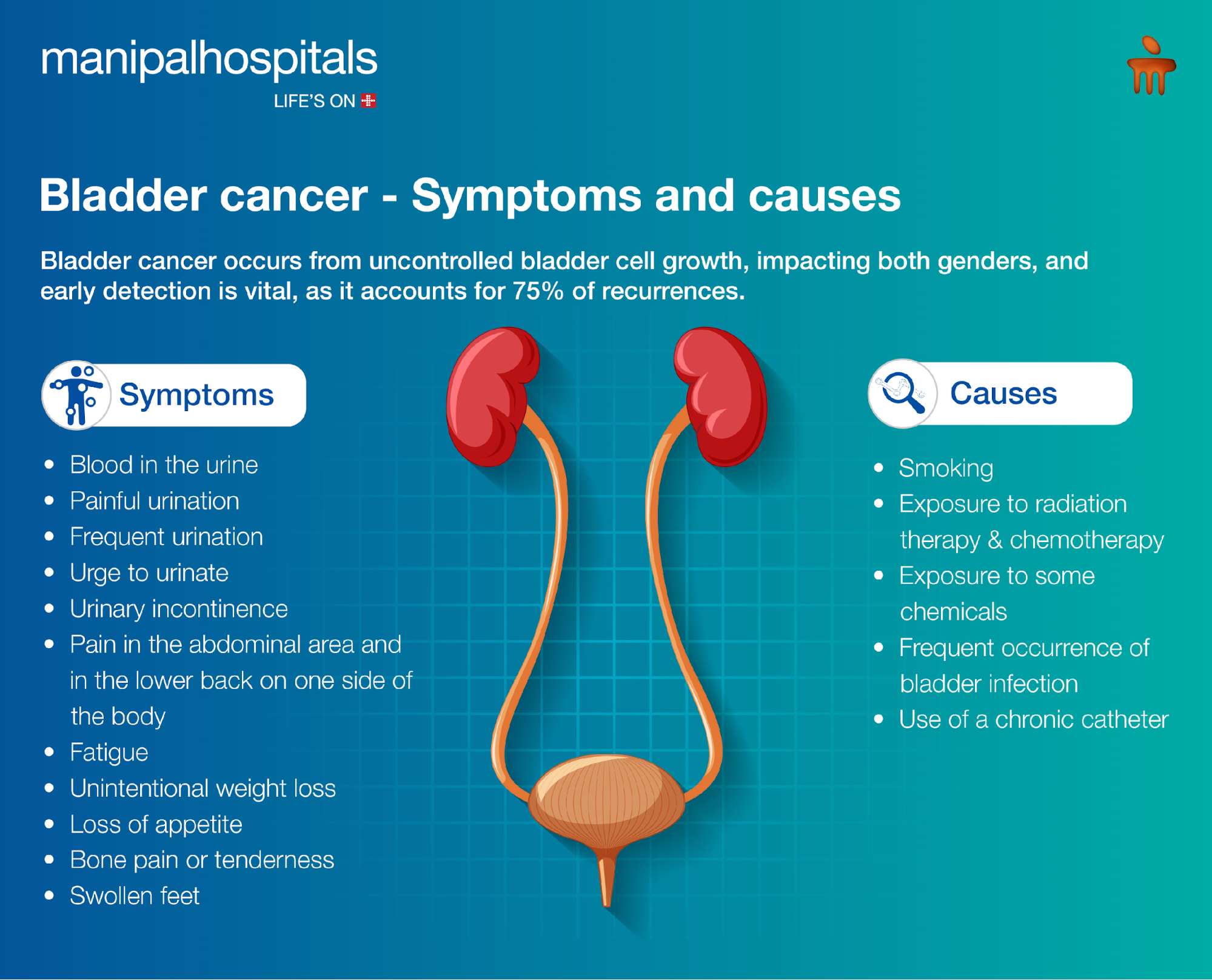
Bladder cancer is a rare form of cancer that begins in the bladder lining. Surgery is the main modality of treatment. However, there are chances of cancer recurrence; even after therapy, bladder cancer may recur, so those who have it should be watchful in making sure they follow up with their healthcare providers.
What is Bladder Cancer?
The lining of the bladder is where bladder cancer, a very uncommon type of cancer, first appears. The bladder, a little hollow organ, is where urine is stored. Urine is collected by the bladder from the kidneys before being expelled from the body through urination.
Bladder cancer develops when abnormal bladder cells divide and expand uncontrollably. They can form tumours and spread to nearby muscles and organs over time. It is the fourth-most common type of cancer in men. Women are also affected. Early-stage bladder cancer, which can be diagnosed and treated before it spreads, accounts for around 75% of bladder cancer recurrences.
Bladder cancer is classified as either benign or malignant. As malignant bladder cancer spreads quickly, it can be fatal. It can harm tissues and organs if not treated.
This blog will help in understanding everything that is required to know about bladder cancer, including its symptoms and causes.

Symptoms of Bladder Cancer
The most common sign of bladder cancer is blood in the urine. However, having blood during urination alone is not a guarantee that someone has bladder cancer. This problem is also caused by other factors. But if any individual notices blood in their urine, they should see a doctor right away. Other bladder cancer symptoms include:
-
Blood in the urine, which may be invisible, bright crimson, or rust-coloured.
-
Painful urination
-
Urinating more than normal (frequent urination).
-
A sudden, strong, and uncontrollable need to urinate (urgent urination).
-
Inability to control one's bladder (urinary incontinence).
Particularly if the cancer has grown outside of the bladder, bladder cancer symptoms can also extend to other parts of the body. These may include:
-
Pain in the abdominal area.
-
Pain in the lower back on one side of the body.
-
Fatigue
-
Unintentional weight loss.
-
Loss of appetite
-
Bone pain or tenderness.
-
Swollen feet
Visit a top cancer hospital in Mangalore if you are experiencing bladder cancer symptoms.
Causes of Bladder Cancer
Healthcare providers and academics are unsure why certain bladder cells change and turn malignant. They have discovered a slew of risk factors that could boost your chances of acquiring bladder cancer, including:
-
Smoking
Cigarette smoking increases the chances of developing bladder cancer. Smoking pipes and cigars, as well as being exposed to second-hand smoke, are the major causes of bladder cancer.
-
Exposure to radiation therapy and chemotherapy
Cancer radiation therapy may increase the risk of developing bladder cancer. The use of certain chemotherapy drugs may increase the chances of bladder cancer.
-
Exposure to some chemicals
According to studies, there may be a higher risk for people who work with specific chemicals found in dyes, rubber, leather, paint, some fabrics, and hair care products.
-
Frequent occurrence of bladder infection
The risk of squamous cell carcinoma may be higher in people who frequently experience bladder infections, bladder stones, or other urinary tract infections.
-
Use of a chronic catheter
Squamous cell carcinoma may develop in those who require a bladder catheter on a regular basis.
Consult the best oncologist in Mangalore if you need bladder cancer treatment.
Conclusion
Bladder cancer starts in the lining of the bladder and can be treated with surgery. Early-stage bladder cancer often comes back after treatment. Bladder cancer is more common in men and people designated male at birth. Women and people designated female at birth usually have advanced forms of the disease due to a lack of awareness. Untreated bladder cancer can spread and affect life expectancy. Early detection and treatment increase the chance of living longer. Half of all people with bladder cancer have early-stage cancer that's relatively easy to treat. Nowadays, doctors also try to treat such patients with a less radical approach, without surgery.
Immunotherapy, Radiotherapy and Chemotherapy help patients with conservative approaches. Treatments are often guided by Onco-surgeons & Uro - Oncologists.
Frequently Asked Questions (FAQs)
-
What is the cause of bladder cancer?
Chemical exposure and tobacco use both increase the risk of developing bladder cancer. These, though, might have various effects on different people.
-
What is the early symptom of bladder cancer?
Haematuria, or blood in the urine, is commonly the first indication of bladder cancer. If there is enough blood, the urine may turn orange, pink, or, less frequently, dark red.
-
Who is at risk for bladder cancer?
Bladder cancer is more common in men and people designated male at birth. Women and people designated female at birth usually have advanced forms of the disease due to a lack of awareness.





















 4 Min Read
4 Min Read




















